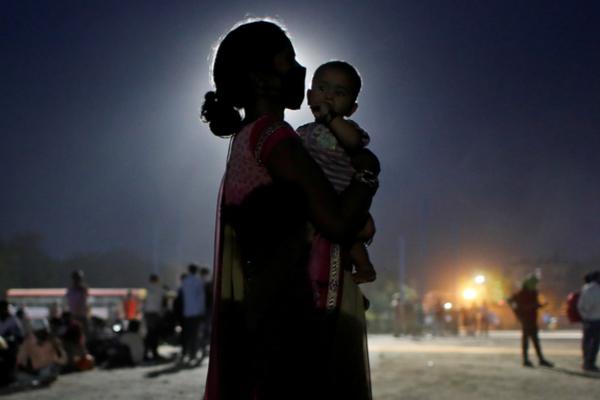If we’re following the church calendar, we’re now picturing Mary, mother of Jesus, just over eight months pregnant. She and Joseph, having reached an uneasy togetherness after reckoning with the fact that this is not his baby, receive word that a Roman census is underway (Luke 2:1-4).
There must have been a deadline and some sort of punishment for not complying, for I cannot think of what else would behoove a woman bursting at the seams with child to hop on a donkey and trek to a town 90 miles away. I imagine Mary had sister-friends in Nazareth who would have brought water and coached her to breathe when the first pangs of labor kicked in, maybe a midwife on call; in Bethlehem, however, she’d be on her own.
As I’m picturing Mary, belly sagging, setting out from the safety of her home, 2020 news images superimpose in my mind: bewildered women in masks sitting on exam tables at an open-air prenatal clinic in Los Angeles. A woman in hospital isolation with her newly-delivered baby crying across the room, unable to kiss her child until the COVID-19 test results return. A Black woman clutching one twin baby – the other one died in the womb of a preventable death amid the initial shutdowns in March.
Like Mary, women the world over have had their childbirth plans disrupted by the pandemic, their path to motherhood rerouted, especially women of color. Before the pandemic, Black and Latina women already had higher rates of pregnancy-related complications than white women; a 2019 CDC report found that Black, Indigenous, and Alaska Native women are two to three times more likely to die of pregnancy-related causes than white women. During the pandemic, the factors contributing to these disturbing statistics – job insecurity, stress, poverty, medical bias, and lack of medical access – have compounded.
Though comprehensive studies on the impact of COVID-19 on the racial disparities among pregnant women are not yet available, initial research from the CDC suggested that “pregnant women who are Hispanic and black might be disproportionately affected by SARS-CoV-2 infection during pregnancy.” Health providers have expressed concerns about the risk of increased mood disorders for Black women during pregnancy; in one hospital, women who “appeared to be Native American” were singled out for COVID-19 testing and separated from their newborns while awaiting results. These emotional burdens will unfold in our lives for years to come, making our mothering task heavier.
But instead of seeing the ways that society is set up that undermine brown mothers’ abilities, the dominant culture makes character judgments. These dynamics come to life in Celeste Ng’s novel Little Fires Everywhere: Elena Richardson, a white woman raised in a picture-perfect suburban community, believes she would never have gotten herself in the position of Bebe Chow, a Chinese immigrant and single mother who leaves her baby at a fire station when she is unable to feed her. When Chow later seeks to regain custody of her child, a white male judge deems Chow to be an unfit mother.
If Mary lived in our time, her mothering credentials would also surely be questioned. She gets knocked up before marrying Joseph and claims it was the Holy Spirit. She’s poor. She’s not well-connected and can’t get into a legitimate inn in Bethlehem. Why did she not plan for the census but procrastinate until her due date? Mary doesn’t appear at all responsible or ready for motherhood.
Listening to Chow keening over the loss of her child in Hulu’s adaptation of Ng’s novel, I hear the cries of so many other displaced brown mothers whose ability to do what is in their bones to do is questioned, whose visceral connection to their own children has been rendered tenuous under the imperial, colonial gaze.
There’s the slave woman, whose child was a commodity to be sold, whose worth was measured in terms of potential income for the slaveholder. The Native American woman, whose children were seen as blank slates for evangelization and Americanization and shipped to boarding schools. The undocumented women who clean the toilets for the men who decide whether they can stay in the same country with their children or not. It’s not always white men, of course. White women, Latino men, Asian women, all people can see through the lens of the imperial gaze, can assess human worth according to what benefits the empire.
My own mother was undocumented. Unable to work most jobs without an employment visa, she started a Chinese restaurant with my stepdad in a small, southeast Texas town, where I attended junior high and high school. I helped waitress, run the cash register, and babysit my two younger siblings. We were one of a handful of Asian families in town.
I can only ever remember my mom attending one dance performance when I made the drill team. She was at the restaurant every other time. I wanted to be mothered by the Elena Richardson’s of our town — the mothers that showed up to every game and made homecoming corsages for their daughters.
Instead, my mom made dumplings on New Year’s Day, admonished me to wear socks on the bare tile so I wouldn’t catch cold, and brewed Chinese herbs when I did get sick. How would American society judge my mother against the standards of what we believe mothers should be? Certainly, she loved me and worried about me enough. But was she – as an undocumented, working mother at the margins, embroiled in her own struggles and traumas – a “good mom”?
There is a story, recounted in several of the gospels, where Jesus essentially disowns Mary. He is talking to a crowd inside when Mary and his brothers come to the door asking for him. Jesus replies, “Who is my mother and who are my brothers?” and then points to his disciples, saying that his family is “whoever does the will of my Father in heaven …” (Matthew 12:46-50).
We read these words generously, of course. Jesus isn’t disowning Mary but widening the circle of kinship from blood relatives to all who seek the kingdom of God. That’s a good thing. But I wonder what Mary felt then, to have her decades of intimate, bodily labor subsumed under a greater cause.
And yet – regardless of the color of our skin – children leave us. They get folded into larger movements, institutions, and stories – the stories we tell ourselves about who we are, and who we are not. For some mothers, our children are taken before they are ready to leave on their own. Authorities in the form of slave traders, government workers, police officers, or ICE officials swoop them away. (I know, in some cases, this is for the children’s safety. But too often, it’s not about safety but about fear and power.)
I left my mother after high school, flying off to the other side of the country to attend college near Chicago. Like any Chinese daughter, I felt those inextricable ties of obligation. But they chafed against all that I wanted to do and be. I preferred to leave my roots – my parents’ undocumented status, our family dysfunction, our struggle as the only Chinese family in town – out of the stories I told myself and others about who I was. Instead, I was a Jesus-follower, an aspiring anthropologist, and about to change the world. I married a white man and we have three little boys who pass as white.
When my oldest was a baby and we lived in the Chicago suburbs, I took him regularly to the public library for story times. Many of the women pushing babies around in strollers there were brown nannies caring for white children.
I got mistaken, once, as my son’s nanny. I laugh to tell the story now. But knowing what I know – what I’ve learned – about brown mothers and how our claim to our children is so often undermined, that incident now seems loaded with foreboding. Already, my oldest sees himself more as his father’s son than his mother’s darling. Each of my boys, I know, will expand their universes more and more until I become a peripheral figure, like Mary asking for Jesus outside the house. They will call themselves – I hope – names like Artist and Advocate and Citizen and Helper and Father. They will forget what it was like to nurse at my breast. I will be displaced, and – Lord willing – I will make my peace.
But I will still be their mother just as all displaced brown women have stood their ground as mothers to the children their bodies have made.
I imagine Mary, waiting outside the door, when Jesus asked, “Who is my mother?” After hearing his lofty proclamation, she whispers, under her breath, “But I am still your mother. My body remembers you. My womb holds your shape. Whatever you forget, whatever comes between us, whatever the authorities say, I will always be your mother.”
Got something to say about what you're reading? We value your feedback!







